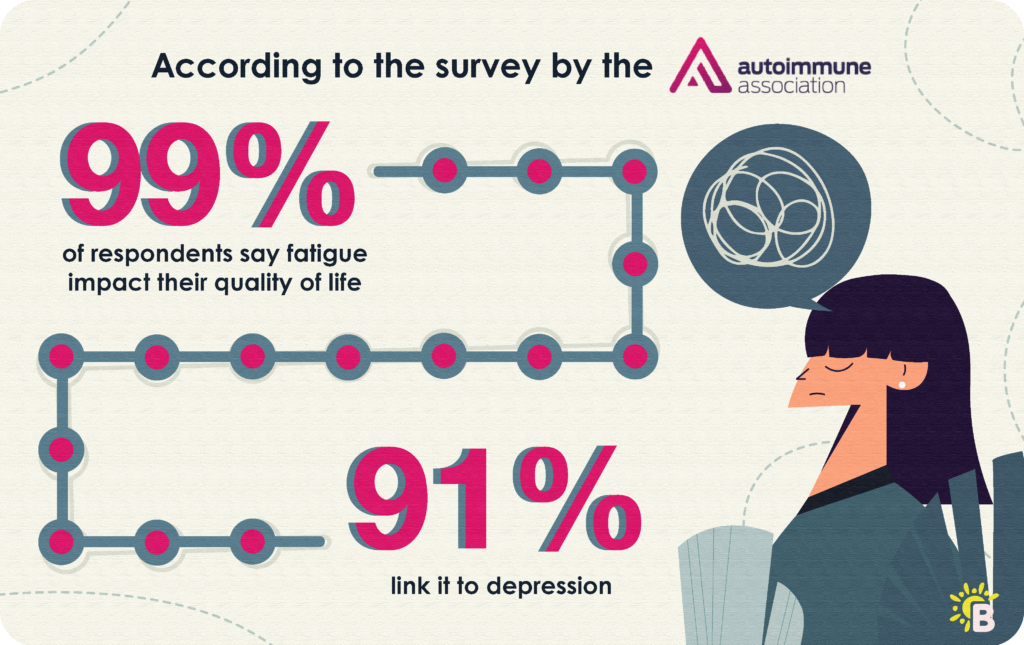
Autoimmune Fatigue: Why It’s More Than Just Feeling Tired and How to Overcome It
Autoimmune fatigue is a common symptom for those with autoimmune conditions, and it goes beyond just feeling tired.
When you’re constantly exhausted, your body is under more stress, which can trigger or worsen autoimmune responses.
This can lead to:
- increased inflammation
- more severe symptoms
- longer recovery time
Fatigue also affects mental health, making it harder to cope with the daily challenges of living with an autoimmune condition. That said, managing our energy daily is crucial for improving our quality of life and preventing flare-ups.
Understanding Autoimmune Fatigue
Autoimmune fatigue is not just regular tiredness; it’s a deep, ongoing tiredness that affects the body and mind. And here’s the kicker: it doesn’t get better with sleep alone.
Is It Tiredness, Fatigue, or Burnout?
Tiredness is a normal feeling of needing rest or sleep that usually improves after a good night’s sleep.
Fatigue is a constant feeling of being very tired that doesn’t go away with rest. It affects both your body and mind, making it hard to function normally.
Unlike regular tiredness, autoimmune fatigue doesn’t improve with sleep; you might wake up just as tired as before. It impacts your whole body, making simple tasks hard, and includes muscle weakness and an overwhelming sense of tiredness.
It often comes with “brain fog,” which makes it hard to concentrate, think clearly, or remember things. This fatigue is unpredictable, typically worsening during disease flares or periods of stress.
Lastly, burnout is extreme tiredness and stress that comes from prolonged activities, often related to work or caregiving. Unlike regular tiredness, burnout can leave you feeling emotionally and physically drained, and it usually takes more than just rest to recover.
Understanding the differences between these states can help in managing your health and well-being more effectively.
What Autoimmune Fatigue Feels Like
It’s one thing to define autoimmune fatigue, but it’s another to truly understand how it feels unless you live with it. Here’s what some people living with autoimmune have to say:
- “If I could stop being so tired all the time, that would be great.“
- “I am physically exhausted, in a great deal of pain, and have zero energy. Just trying to take a pic and write this is horrendous.“
- “Too often, I had to refuse invitations to hang out because of fatigue, so there were fewer invites as each day passed.“
- “I don’t know how many coffees it takes to beat fatigue, but so far it isn’t 12.“
- “Life is really tough, and usually, I get told I’m just lazy because I don’t have the energy to do things or that I’m not listening because I don’t understand what I’m being told in class due to exhaustion or even just the language barrier.“

This highlights how pervasive and challenging autoimmune fatigue can be, affecting not just physical health but also emotional well-being.
How to Fight Autoimmune Fatigue
1. Anti-inflammatory Diets
Anti-inflammatory diets can help manage fatigue, especially for people with chronic diseases like Multiple Sclerosis (MS) and Rheumatoid Arthritis (RA). These diets work by lowering inflammation in the body and can significantly reduce fatigue and improve quality of life.
Specific Diets to Consider:
- AIP (Autoimmune Protocol): Focuses on eliminating foods that can trigger autoimmune responses and gradually reintroducing them to identify sensitivities.
- GAPS (Gut and Psychology Syndrome): Aims to heal the gut lining and restore gut flora by focusing on easily digestible foods and avoiding complex carbs.
- SCD (Specific Carbohydrate Diet): Restricts certain carbohydrates to improve digestion and reduce gut inflammation, beneficial for autoimmune conditions.
2. Stress Management Techniques
Stress can worsen inflammation and fatigue. Check out our top stress management strategies for autoimmune relief. These can help reduce stress levels, manage fatigue, and improve overall well-being.
3. Natural Remedies and Lifestyle Changes
Natural supplements and herbs (vitamins B and D)
- Vitamin B Complex: Essential for energy production and reducing fatigue. B vitamins (B1, B2, B3, B6, B12) support energy metabolism and nervous system health.
- Vitamin D: Important for immune function and reducing inflammation. It helps modulate the immune response and reduce oxidative stress, which can alleviate fatigue.
Combining vitamins B and D can enhance energy production, support immune function, and reduce inflammation, helping to combat autoimmune fatigue.
Supplementation Tips: Consult with a healthcare provider before starting supplements. Follow recommended dosages and choose high-quality products from reputable sources.
Importance of sleep, mindfulness, and relaxation techniques
- Sleep
Adequate sleep is vital for health and well-being. It supports the immune system, reduces the risk of chronic diseases, and helps manage stress and depression.
Sleep also enhances memory and learning. Consistent sleep patterns are crucial for maintaining good sleep quality and overall health.
- Mindfulness
Mindfulness, such as meditation and mindful breathing, reduces stress and anxiety.
It promotes emotional regulation and improves focus and cognitive flexibility.
Practicing mindfulness regularly can lead to better mental health and well-being.
- Relaxation Techniques
Relaxation techniques like deep breathing and muscle relaxation help manage anxiety and improve physical health by reducing tension and stress-related conditions.
These techniques benefit everyone, including the elderly and pregnant women.
4. Pacing Physical Activity
Avoiding the cycle of overexertion and extreme fatigue
Autoimmune fatigue worsens with overexertion. Pushing beyond energy limits leads to extreme exhaustion, making it crucial to break this cycle for effective symptom management.
Pacing
- Activity Management: Break tasks into smaller segments and alternate with rest periods.
- Gentle Movements: Incorporate light activities such as stretching or short walks.
- Scheduled Rest: Incorporate regular rest periods throughout the day.
Energy Conservation Techniques
- Prioritizing Tasks: Focus on essential activities and delegate or postpone others.
- Simplifying Tasks: Use tools to make tasks easier, like sitting while doing chores.
- Planning Ahead: Plan activities to avoid peak fatigue times and distribute energy evenly.
Final Thoughts
Autoimmune fatigue is a persistent, debilitating condition that increases stress, inflammation, and symptom severity, impacting daily life and mental health. To manage it, consider adopting an anti-inflammatory diet, practicing stress management techniques, and using supplements like vitamins B and D.
If you need expert resources and recommendations to get started, sign up for our membership today and get exclusive access, not just to one, two, but five autoimmune health and wellness coaches– our ThriveGuides™, for direction and support. Plus, our community will be right behind you in this healing journey. By integrating these strategies, you can better manage autoimmune fatigue, improve your overall well-being and enjoy life more.
References
Fatigue and autoimmune disease. (2024, January 16). Harvard Health. https://www.health.harvard.edu/diseases-and-conditions/fatigue-and-autoimmune-disease
Kmiecik, C. (2022b, September 13). Beyond Tired: Fatigue and Autoimmune Disease. Autoimmune Association. https://autoimmune.org/beyond-tired-fatigue-and-autoimmune-disease/
Anti Inflammatory Diet. (2024b, February 20). Johns Hopkins Medicine. https://www.hopkinsmedicine.org/health/wellness-and-prevention/anti-inflammatory-diet
Scheiber, A., & Mank, V. (2023, October 28). Anti-Inflammatory Diets. StatPearls – NCBI Bookshelf. https://www.ncbi.nlm.nih.gov/books/NBK597377/
Staff, M. (n.d.). 4 Top Autoimmune Supplements Patients Take. Amy Myers MD. https://www.amymyersmd.com/article/best-supplements-autoimmune
5 Supplements For Your Autoimmune Disease. (2024, July 16). Santa Barbara Naturopathic Doctors, Holistic Health, Pain Relief & Sports Medicine. https://regeneratehealthmc.com/blog/5-supplements-for-your-autoimmune-disease/
Relaxation techniques: Try these steps to lower stress. (2024, January 24). Mayo Clinic. https://www.mayoclinic.org/healthy-lifestyle/stress-management/in-depth/relaxation-technique/art-20045368
Get Enough Sleep – MyHealthfinder | health.gov. (2024, May 1). https://health.gov/myhealthfinder/healthy-living/mental-health-and-relationships/get-enough-sleep
Erdman, S. (2021, April 9). Relaxation Techniques: Learn How to Manage Stress. WebMD. https://www.webmd.com/balance/stress-management/features/blissing-out-10-relaxation-techniques-reduce-stress-spot
9. Pacing Strategies | ME/CFS & Fibromyalgia Self-Help. (n.d.). https://www.cfsselfhelp.org/library/9-pacing-strategies
Fatigue. (2023, February 11). Mayo Clinic. https://www.mayoclinic.org/symptoms/fatigue/basics/causes/sym-20050894
TAGS:
CATEGORIES:






